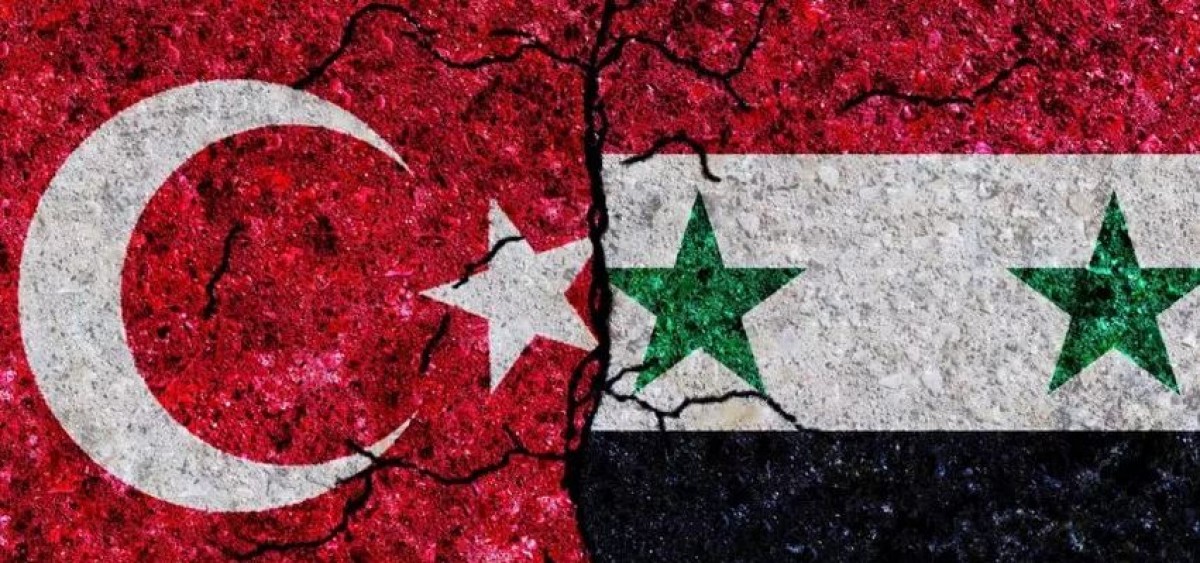 537
537
A Diplomatic Thaw: Turkey's Reckoning with Its Syrian Misadventure
A Diplomatic Thaw: Turkey's Reckoning with Its Syrian Misadventure
By: A. Yeganeh
In recent weeks, media circles have reignited the discussion surrounding the complex and historically strained relationship between Syria and Turkey. Following the meetings between their respective foreign ministry officials, aimed at enhancing bilateral relations, the conversation regarding a potential thaw in the icy diplomatic atmosphere that has existed since the Syrian of 2011 has again taken center stage. Within the broader context of West Asia’s tumultuous political landscape, this rapprochement represents a significant development, one that could ripple across the region, signaling an essential shift toward stability in an area long plagued by conflict.
The Turkish government, and more specifically President Erdoğan, appears to have grasped, albeit belatedly, the importance of nurturing positive relations with its war-torn neighbor. The overtures toward normalization between the two nations not only underscore a strategic recalibration but also highlight the delicate interplay of regional security, migration, and economic distress that Turkey must now navigate. However, these moves are far from altruistic; they are instead an attempt to untangle Turkey from the consequences of its past interventionist policies in Syria—a theater where Ankara's actions have only contributed to the exacerbation of turmoil and displacement.
Central to this issue is the plight of over three million Syrian refugees currently residing in Turkey, a staggering number that has, by all accounts, become a double-edged sword for Ankara. On one hand, these refugees represent a significant strain on an already fragile Turkish economy—a burden that Turkish officials blame for hampering the nation’s economic progress. The impact of such a vast refugee population is not merely economic; the security ramifications are deeply unsettling. Turkey, already grappling with internal strife, must now contend with the looming threat that this community could be manipulated by foreign intelligence services to further destabilize the country.
For Erdoğan, the logic is simple but fraught with complexity: by repairing relations with Syria, he hopes to facilitate the return of these refugees, thereby alleviating Turkey’s economic woes and reducing the security risks posed by their continued presence. This approach, however, is layered with irony, for it was Turkey’s own misguided interference in Syria’s civil conflict that led to the refugee crisis in the first place. By now seeking to restore ties with Damascus, Ankara is attempting to remedy the very chaos it helped unleash—a grim testament to the cost of Turkey’s misadventures in Syria.
The role of Russia in this diplomatic overture cannot be overstated. Moscow, a long-time ally of the Assad regime, has been a persistent advocate for the normalization of Turkish-Syrian relations. For President Putin, this initiative offers a strategic opportunity to undercut Turkey’s destabilizing influence in Syria, particularly its support for various militant groups that have perpetuated violence in the region. By encouraging Turkey to disengage militarily and financially from the conflict, Russia hopes to shore up Syria’s fragile security, relieving itself of the exorbitant military expenditures necessary to suppress these insurgents. This calculated move by Moscow not only reinforces its dominance in Syria but also diminishes the need for continued Russian intervention, all while neutralizing a key player—Turkey—from further meddling in Syrian affairs.
From Damascus’s perspective, the normalization of ties with Turkey marks a significant diplomatic triumph. In recent years, Syria has made concerted efforts to reclaim its standing on the international stage—rejoining the Arab League and reopening foreign embassies in Damascus are just two of the notable strides toward that end. Repairing relations with Turkey, a nation that has long been both a rival and a reluctant partner, strengthens Syria’s hand as it seeks to rebuild from the devastation of civil war. This renewed partnership offers not only political capital but also economic lifelines that could assist in the country’s painstaking reconstruction efforts.
In the grander scheme of geopolitics, Turkey’s eagerness to mend fences with Syria is undoubtedly motivated by domestic political concerns, particularly regarding the refugee issue. Many political analysts close to Erdoğan have pointed to the Turkish government’s handling of the Syrian refugee crisis as a key factor in the ruling party’s defeat in the last elections. Hence, the normalization efforts may be seen as a last-ditch attempt to reverse this trend, appeasing a Turkish electorate increasingly frustrated with the socio-economic burdens of hosting millions of displaced Syrians.
For key regional powers like Iran and Russia, the thawing of relations between Ankara and Damascus could serve as a decisive turning point in securing Syria’s future. At a time when the West Asian region teeters on the brink of yet another major conflict—this time between Iran and the Israeli regime—the détente between Turkey and Syria offers a rare glimmer of hope for the Tehran-led Resistance Axis.’ These countries may find in Syria a vital staging ground for their broader ambitions against Israel, and normalization with Turkey helps solidify the geopolitical chessboard, allowing them to plan their retaliatory moves with greater confidence and precision.
In sum, Turkey’s diplomatic recalibration vis-à-vis Syria is more than just an exercise in reconciliation; it is a complex, multifaceted effort to realign itself within a volatile region. The implications of this rapprochement extend far beyond mere bilateral relations—they speak to the broader strategic realignments occurring across West Asia, with the potential to shift power dynamics and influence the outcome of future conflicts. For Erdoğan and his government, the stakes are high, and the success of this initiative could very well determine Turkey’s role in the region for years to come.
 537
537
Comment
Post a comment for this article